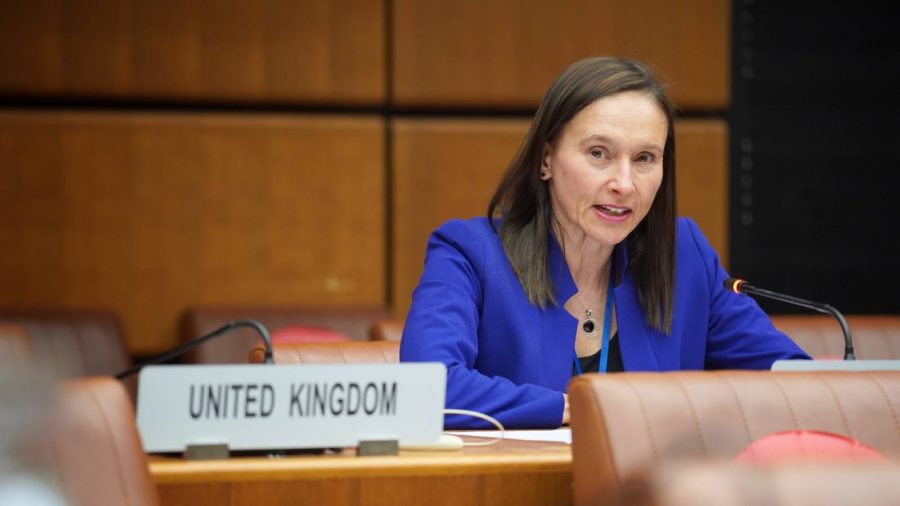8th March 2024 Vienna
Gender equality is non-negotiable

Almost a decade ago, the world agreed that by 2030 we must achieve gender equality and empower ALL women and girls.
But, in 2024, we are nowhere near achieving this.
Why? Rather than countries coming together at the United Nations to make progress, a vocal minority are actively trying to undermine gender equality through the UN. This group, led in Vienna by Iran and Russia, digs in and tries to remove gender equality language from UN documents. The same pattern is being seen in the UN Offices in New York and Geneva. The approach is coordinated and happening in multiple negotiations, but the UK – like most other countries – believes gender equality is not up for negotiation in the 21st Century.
As a female diplomat, it is particularly frustrating to have to negotiate with male Ambassadors who show blatant disrespect for the female Ambassadors sat across the negotiating table. But beyond the personal insult, the language we agree in UN texts matters because it gives the UN its mandate, in other words, our resolutions tell the UN both what to prioritise and how to do it.
To give one example, at the last IAEA annual General Conference, Iran wanted to change “gender equality” to “gender balance”. This might seem minor, but in the UN’s work these are two very different concepts. Gender equality is about treating people the same, whereas gender balance is about having merely equal numbers of women and men, rather than making sure they have the same rights which would include protection and empowerment of women. The UK, along with delegations from all regions, spoke against changing the language but even with this concerted effort, we eventually (at 2am on a Friday night!) had to compromise to reach consensus.
For me and my female colleagues it is disheartening that some countries don’t believe that we are entitled to equal treatment. On the one hand, we feel shocked that gender equality is seen as a threat by certain countries. But on the other, there is a renewed sense of unity and energy – from countries across the globe – to work together on this common goal which affects all of us.
Despite these challenges, it is important to acknowledge where we have made progress. In the Vienna UN Offices, the UK co-founded a ‘Group of Friends on Gender’ to work with other countries to protect gender equality. And the UN Office on Drugs and Crime (UNODC) has its own gender team doing fantastic work. In December, UNODC saw its first resolution on the importance of gender issues in tackling corruption, successfully tabled by Ghana – a great achievement. And the UK recently funded the implementation, alongside Canada, of the Toolkit on Mainstreaming Gender and Human Rights when tackling transnational organised crime.
I am proud to work with many fantastic female colleagues and male allies who are flying the flag for gender equality. It is inspiring to see increasing numbers of female Ambassadors here in Vienna and elsewhere – quite a change from when I was starting out in diplomacy back in the 1990s, and something I reflected on a couple of years ago in this interview.
Meanwhile, a year ago the UK Government published the International Women and Girls Strategy which sets out how we will remove the barriers that hold women and girls back. We are working to put this strategy into practice in Vienna and make a difference – domestically and internationally – to overturn gender disparity.
I call on all countries to work together and make 2024 the year we speed up progress towards delivering our collective commitment to the Sustainable Development Goals, including Goal 5 to Achieve Gender Equality and Empower All Women and Girls.
To be fair, this is insanity in a box.
Gender equality is a must. Globally, we cant talk of development when women and girls are denied education, have limited access to public spaces, have no control over their own bodies.
The situation is dire,the world just has to embrace equality.
Well said. Fantastic work.
I hope that international negotiations will drive the conversation towards gender equity. moving beyond gender equality by recognising the need to address gender-based disadvantages. I share the frustration that, while progress is encouraging, all countries need to achieve just transition.
What a wonderful- and worrying -blog; thank you Corinne. Hard to believe that in the 21st century some people still want to classify people into first and second class citizens based on no more than what their underwear covers. Women’s empowerment is not just good for women, its good for achieving ALL SDGs. We need to mobilise the very best – and the totality- of humanity if we’re going to do our best for the next generation. Denying one half of the human race equal rights is like cutting off a leg and then trying to run a race. Kudos to you and all the others upholding this most basic of all human rights- that of equality.
Important blog on an important subject. Thanks Corinne.